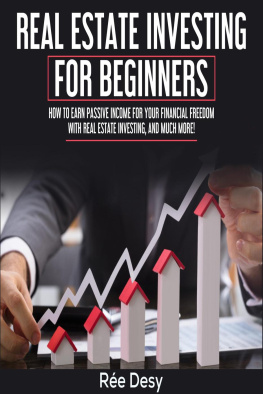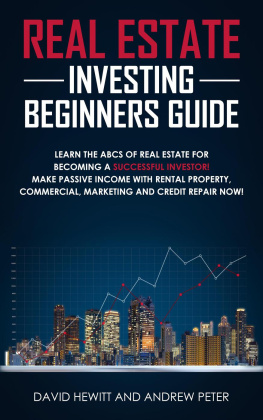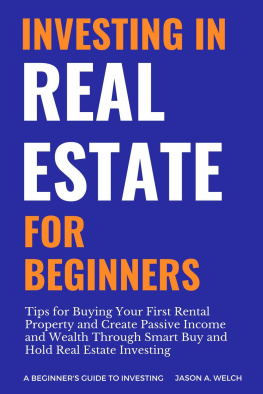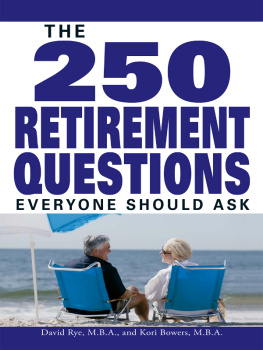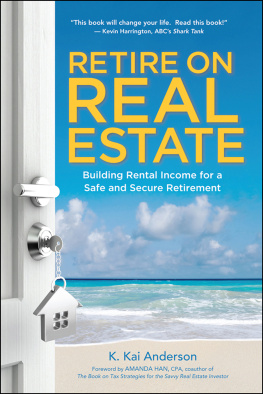This book is dedicated to my mom and dad, who taught me the value of a dollar, the importance of integrity, and the power of perseverance.
Introduction
Re-Conceptualizing Retirement
Retirement: Its nice to get out of the rat race, but you have to learn to get along with less cheese.
GENE PERRET
When Are You Truly Retired?
A comfortable retirement is the goal and promised land of nearly every Canadian. Even for those of us who see ourselves working in our later years on passion projects, we know that once we are not working full-time, our income will likely go down. If were not working full-time, well require income from other sources to survive.
But what exactly is a comfortable retirement? Before answering that, lets answer a more basic question: what is retirement?
Unfortunately, many of us have a misguided concept of this important life period. The tendency is to think of retirement as the day, somewhere out there in the future, when we will quit working. But in reality, retirement should be the day when, if we so choose, we could quit working and would have enough assets to live comfortably for the rest of our lives.
I would add that we should be able to make this life change without lowering our quality of life. Sadly, many people just assume a lower quality of life comes with the package. Many Canadians plan to downsize by selling their family home.
Why do we have this failed notion of retirement? It makes sense when you think about it. Retirement has for many decades been thought of as something our employer would provide for us. We would do our part, of course. Wed contribute to our pension funds and put money in our RRSPs. But someone else would do the bulk of the planning. The pension fund would make the investment and dole it out to us in monthly stipends near the end of life.
Fast-forward to today, and the retirement that was once promised to us is nearly extinct. Sure, some government employees and a small selection of others will still receive their pensions, but for large swaths of society, that old idea of someone else providing us with a retirement is dead.
Everything about retirement has changed, so why hasnt our notion of retirement changed with the times? Its not when we stop working that matters. True retirement is when weve created enough assets and ongoing income (from those assets) to be able to sustain ourselves for the rest of our lives.
The problem with the old conception of retirement is that it doesnt reframe the problem as a plan. Retirement should be thought through and solved like any other problem. We do this all the time with much smaller problems, but we often seem paralyzed when it comes to methodically solving bigger problems like retirement.
Could you live the rest of your life off of only your savings and investments? If so, then youre retired. If not, then youre stuck working.
The answer to this question is completely subjective. First of all, how much income do you need? Some will need only $50,000 per year and others will need $100,000. So, the first thing we need to do is ask what we need in terms of income for lifestyle. Once we know the answer, we can begin to build a portfolio that generates the passive income equal to our lifestyle needs.
Honestly dealing with this issue is a great starting point. But seeing the truth of our retirement picture for the first time can be intensely painful for many. The numbers may seem harsh. We ask: how will I ever be able to create so much income? The goal seems insurmountable because we look at our past ability to save and how much income well be earning over the rest of our working career and wonder where the money will come from.
The problem is that many people never catch up in their savings. They dont get enough money into the market soon enough to make a true difference to their retirement.
The question is valid: where will we find the money?
Many have stopped even expecting to retire without taking a quality-of-life hit. Their plan is to sell their house, downsize to a cheaper condo, and live off the funds. Worse yet, thousands of senior citizens contemplate a more difficult decision: McDonalds or Tim Hortons? Not for coffee either, but to make up the difference between retirement income and expenses. While there are many different retirement goals, we can all agree that working a minimum wage job to make ends meet isnt part of a desirable retirement. Sadly, though, it will be a reality for many thousands of people.
Without the certainty of a great pension (which many of us no longer have), we must look for different solutions.
As a result of my finance education and two decades of experience as a financial planner, mortgage professional, and real estate investor, Ive come to believe that the answer for most people will come from borrowing money to invest in real estate and doing it as soon as possible.
Now, before you slam this book shut and call me a heathen, please give this message a chance. In this book, Ill show conclusively why this strategy is so effective and, in fact, why it might be necessary for securing a stable retirement.
If youre feeling skeptical right now, I want you to know thats a good thing. I urge you to apply the same skepticism to the currently accepted system, because its not working for most Canadians. Think about it: we expect to take a quality-of-life reduction in retirement. Does that sound like a system that works?
I invite your skepticism about borrowing to invest. It means that when you are convinced later in the book, your new belief will be strong and stable. But lets take a look at why skepticism is the most common reaction I get when I mention borrowing to invest.
Our society implicitly believes that debt is evil. Im unsure how we maintain this belief while maintaining record debt levels, but we do. We have a bad case of cognitive dissonance, because even while we consider borrowing to invest to be too risky, we nevertheless borrow massive amounts of money to pay for vacations and luxurious home renovations and to buy toys, like boats.
Pure liabilities.
Did you get that? We think borrowing to invest is risky, but we borrow to buy things that will most definitely never earn a return and in fact will continue to cost us money for years to come.
We have easier access to credit than ever before, and many millions of Canadians have large chunks of what I call dormant home equity that for some reason people have started to think of as free money to play with. Instead of treating these borrowed funds as play money, we should be thinking of them as a great form of investment funds available to us. Nothing is riskier than buying a depreciating asset, and not just for the depreciation either. There is a tremendous opportunity cost when you choose to wait to invest instead of investing borrowed money today.
The purpose of this book is to both inform you and arm you with a plan. Based on my thousands of conversations and years of research, I firmly believe that most Canadians dont correctly understand both the scope of Canadian retirement problems and what exists today in terms of clear solutions to these problems.
The first part of the book will underscore the problems and solutions available. In our current day and age there are specific (changed) conditions forcing many Canadians down a path toward retirement struggle. Ill address these pressures in the first chapter, and yes, it will probably sound dire to many readers.
But there is good news. Just as pressure mounts, new opportunities arise. In the second chapter, Ill show you why I believe these opportun-ities outweigh the challenges. This will set the stage for the rest of the book, where you will learn how to capitalize on these opportunities.


